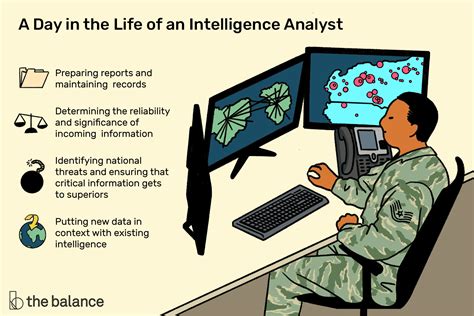Overview
Intelligence analysts play a vital role in national security, law enforcement, and business. They collect, analyze, and interpret information to provide insights and recommendations to decision-makers.

Duties and Responsibilities
Collect Information:
- Conduct research using a variety of sources, including open-source intelligence (OSINT), classified documents, and human intelligence (HUMINT).
- Monitor news, social media, and other platforms for relevant information.
Analyze Information:
- Use analytical techniques to identify patterns, trends, and anomalies in data.
- Interpret information in the context of current events and geopolitical developments.
- Develop conclusions and recommendations based on the analysis.
Produce Intelligence Reports:
- Write and brief intelligence reports that summarize findings and provide insights.
- Present recommendations and potential courses of action to decision-makers.
Specializations:
In addition to general intelligence analysis, analysts may specialize in specific areas, such as:
- Counterterrorism: Analyzing potential threats from terrorist groups.
- Cybersecurity: Identifying and mitigating threats to information systems.
- Economic Intelligence: Monitoring and analyzing economic trends and their impact on national security.
Skills and Qualifications
Intelligence analysts typically require:
- Strong analytical and research skills.
- Excellent written and verbal communication abilities.
- Proficiency in data analysis software and tools.
- Understanding of international relations and geopolitical issues.
- Ability to work independently and as part of a team.
Pain Points
Intelligence analysts face several challenges, including:
- Information Overload: The vast amount of available information can make it difficult to prioritize and identify relevant data.
- Bias and Subjectivity: Analysts’ personal biases and preconceptions can influence their interpretations.
- Time Constraints: Deadlines and urgent requests can limit the time available for thorough analysis.
Motivations
Individuals who pursue a career as an intelligence analyst are often driven by:
- A desire to contribute to national security or law enforcement.
- A passion for analysis and problem-solving.
- A thirst for knowledge and understanding of current events.
Why It Matters
Intelligence analysis is critical for:
- National Security: Providing insights into potential threats and shaping national security policies.
- Law Enforcement: Assisting in crime prevention, investigation, and prosecution.
- Business: Identifying market opportunities, mitigating risks, and making informed decisions.
Benefits
Intelligence analysts enjoy several benefits, including:
- Job Stability: The demand for intelligence analysts is expected to grow in the coming years.
- High Salaries: Median salaries for intelligence analysts are typically above the national average.
- Prestige and Recognition: Intelligence analysts play a vital role in shaping policies and protecting the nation.
Tips and Tricks
- Stay up-to-date on current events and geopolitical developments.
- Develop strong analytical and research skills through education and practice.
- Network with professionals in the intelligence community.
- Keep abreast of new technologies and tools for data analysis and visualization.
Future Outlook
The future of intelligence analysis is bright. Technological advancements, such as artificial intelligence and big data analytics, are creating new opportunities for analysts to enhance their work.
Applications
Intelligent analysis has numerous applications beyond national security and law enforcement, including:
- Risk Management: Identifying and mitigating risks in business, finance, and healthcare.
- Market Intelligence: Gathering and analyzing data to gain insights into market trends and opportunities.
- Supply Chain Management: Monitoring and optimizing supply chains for efficiency and security.
- Predictive Analytics: Utilizing data to forecast future events and make informed decisions.
Tables
Table 1: Median Salaries for Intelligence Analysts
| Industry | Median Salary |
|---|---|
| National Security | $95,000 |
| Law Enforcement | $80,000 |
| Business | $75,000 |
Table 2: Projected Job Growth for Intelligence Analysts
| Year | Projected Growth |
|---|---|
| 2022-2032 | 8% |
Table 3: Top Skills for Intelligence Analysts
| Skill | Importance |
|---|---|
| Analytical Abilities | Critical |
| Research Skills | High |
| Data Analysis Software Proficiency | Moderate |
| Communication Abilities | Moderate |
| Understanding of International Relations | Moderate |
Table 4: Emerging Trends in Intelligence Analysis
| Trend | Description |
|---|---|
| Artificial Intelligence (AI) | Enhancing data analysis and predictive modeling |
| Big Data Analytics | Facilitating the analysis of massive datasets |
| Open-Source Intelligence (OSINT) | Increasing the availability of information for analysis |
| Cybersecurity Intelligence | Analyzing threats and vulnerabilities to information systems |
